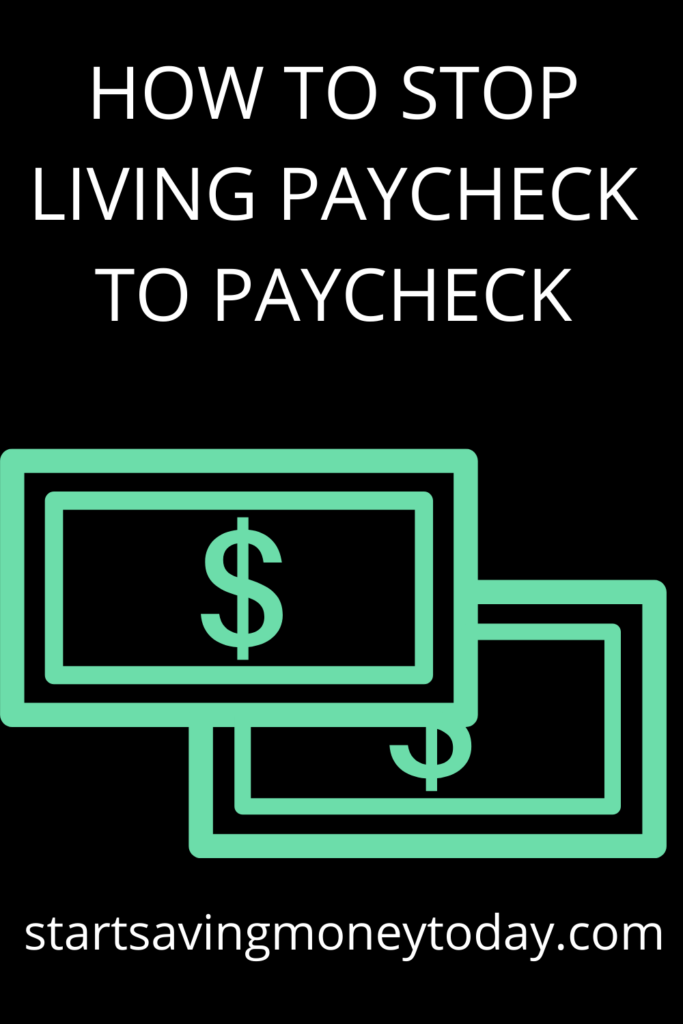How To Stop Living Paycheck To Paycheck
If you live paycheck to paycheck, you’re essentially broke. In the past, often described the circumstances of people holding low-paying jobs. We called them the working poor. Now many wage earners making $100,000 a year (or more) find themselves living that lifestyle. Living paycheck to paycheck is becoming an epidemic. So the question is how to stop living paycheck to paycheck.
Not living paycheck to paycheck is a benefit of frugal living.
It’s A Lifestyle
Living paycheck to paycheck describes the lifestyle of someone who spends most, if not all, of their money as it comes in. It can be said to be a hand-to-mouth existence because financial revenue is consumed (used) almost immediately. People who live paycheck to paycheck rarely have savings, and they’re frequently out of money before their next payday arrives.
Usually, but not always, a person lives paycheck to paycheck because they make poor financial decisions like acquiring too much debt. Usually, people that acquire too much debt are suffering from lifestyle inflation.
Who’s Living Paycheck To Paycheck
It’s hard to believe, but in the US 78% of adults are living paycheck to paycheck. That’s a real eyeopener! There’s a good chance that almost everyone you know is living hand-to-mouth. If you’re living hand to mouth you’re certainly not alone, but wouldn’t it be freeing, if you didn’t have the stress that goes with that lifestyle?
There is a simple solution to this problem. More on this later.
Problems With Living Paycheck To Paycheck
I’ve already mentioned that many people living like this find their money doesn’t really get them from one payday to the next. As for having money left over? Most might as well forget about that.
When you’re chronically short of money, you can be sure you’ll have problems. Among them, you’ll find you’re usually:
-
Constantly trying to make ends meet
-
Going into debt
-
Struggling to pay bills
-
Going into more debt
-
Trying to find wiggle room when life happens
-
Going into even more debt
-
Unable to save for retirement
How To Stop Living Paycheck To Paycheck
The truth is simple: You need to be in control of your money and live below your means. To stop living hand-to-mouth, you need to spend less than you earn. The next thing I’m going to do is suggest several practices that can help you govern your spending.
Spending Journal
Keep a spending journal.
Most people only think they know where their money goes. Many are surprised after they track their expenditures. You can’t control what you don’t
know. If you don’t know where your money is going, you can’t funnel it into a better place. A spending journal is an excellent way to find out what you really spend your money on. It will also reveal your spending patterns which may allow you to institute some lifestyle changes that could save you some money.
Budget
 Use a budget to administer the use of your funds.
Use a budget to administer the use of your funds.
Make a budget
Sinking Funds
Employ sinking funds.
Sinking funds are a great budgeting hack. They can speed the process of becoming debt free and to an even greater extent aid in keeping you debt free. I think sinking funds are an advanced method for managing that will elevate your efforts to use your money efficiently above those of others also trying to live frugally.
Things that will help you stop living paycheck to paycheck
After identifying your spending habits (Not just the bad ones, look for the good ones too.) and as you begin to put together your budget, think about ways to make your money go further. You’ll have to, if you want to get out of the living paycheck to paycheck cycle.
Trim Expenses
Look at how you’re spending your money. What does it go for? Is everything you’re spending money on necessary? Your spending journal will come in handy in this analysis. It simplifies the process; you won’t have to try to remember where every dollar went.
As you review your expenditures, you’ll probably find a number of places to trim costs, but I’ll include a short list that may help you get out of the living paycheck to paycheck cycle.
Save Money On Groceries
When I first looked into saving money on groceries, I was surprised at how much money I could save simply by using a list. Shopping sales and  couponing also help. I’ll admit my introduction to those practices happened many years ago, but as of yet they still yield results. You may be able to save money on your groceries doing the things I mentioned.
couponing also help. I’ll admit my introduction to those practices happened many years ago, but as of yet they still yield results. You may be able to save money on your groceries doing the things I mentioned.
Save Money On Your Electric Bill
It’s the little things that add up. Unfortunately, we frequently miss them—things like turning off a light when leaving the room or turning down the thermostat when no one is home. Learn how to save money on your electric bill.
Save Money On Car Insurance
The spread on the cost of car insurance premiums is big. I can’t believe the difference in price between one insurance agency and the next. Also, some  insurance agencies will give you a discount if you’ve had no accidents or if you pay for six months coverage at a time. You can save money on car insurance if you shop around.
insurance agencies will give you a discount if you’ve had no accidents or if you pay for six months coverage at a time. You can save money on car insurance if you shop around.
Get Out Of Debt
If you have debt, you’re not only repaying what you borrowed, you’re paying interest for the “privilege” of using someone else’s money. It makes sense to design your budget around getting out of debt as quickly as possible. Becoming debt free is a logical step. As you pay off revolving credit the more money you’ll have for living now. As you become debt free, it becomes less likely you’ll need to live the hand to mouth existence .
Commitment
Bloggers who post on improving personal finances (that includes me) often make it seem fairly simple to change your financial lifestyle. And, it is… One of our biggest tenets is spend less than you make. That’s pretty simple.
Everybody (including you and me) knows that simple isn’t always easy. There are decisions to make and actions to take that can affect your present lifestyle in order for you to have a future. But…how’s living hand-to-mouth, working for you? What kind of future will it give you? Sometimes we need to make sacrifices or tradeoffs to get to where we want to be.
Sacrifices Or Tradeoffs
Sacrifices and tradeoffs are personal. It’s about your mindset.
Sacrifice usually means giving up something you really want. Be it that weekly night out on the town, tickets to the football game, your kid’s dance classes, or…you name it, none of us feels good about giving up anything.
A long time ago, I realized there are things I really, really, don’t want. Being homeless is one. Being without a car are is another.
Quite a few years ago, I hung with people who went out a lot and partied a lot. We went (very) regularly to restaurants, shows, and concerts. It was fun. We were also all very short of money for anything other than our party lifestyle. Yeah…we were all pretty much living paycheck to paycheck. I began to get behind on a couple of bills and eventually became concerned about paying my rent. Also, I was accumulating debt. It took a while to get to this point, but—eventually—I knew I couldn’t keep that up if I didn’t want to be homeless. And for sure, I didn’t want to be homeless. I decided I’d rather not spend money on all that entertainment than be homeless. I sacrificed the party lifestyle to get my finances in order. (A big part of that was getting out of debt and making my money go further.)
I just said I made a sacrifice, but it really was a tradeoff. I gave up something to avoid losing what I really wanted—a home of my own versus crashing on a series of other people’s couches (which is where I’d been headed). Tradeoffs are a choice and each of us must decide what’s worth our money. (Perhaps I should have said what’s worth our life, because that’s what we exchange for our money.) I chose to get away from the paycheck to paycheck grind.
Now, would you like to know what’s really good about tradeoffs? They can be temporary. I mean, it really didn’t take long before my finances were stable enough to allow some funds for entertainment. I just couldn’t take it to the extreme I had before. (Learning that was a life lesson on almost everything.) The next couple of sections cover a some other tradeoffs that don’t always have to be permanent sacrifices.
Moving
In most cases our largest expense is paying for where we live. Living quarters hold too many people, hostage. Moving to a less expensive place could be a good option. This could be a temporary tradeoff. I know a couple who solved their money problems by moving into a rented trailer for 5 years. (Note: The trailer was not rundown, but it wasn’t a new, top of the line one either. The home they rented out was nice. In fact, they still own it and they’re back in it now. The rent they charged for their house covered their mortgage and the rent they paid on the trailer. The move to the trailer was part of their plan to stop living paycheck to paycheck. It was a tradeoff to free more of their money so they could apply it to paying down debt. And it was temporary.
a good option. This could be a temporary tradeoff. I know a couple who solved their money problems by moving into a rented trailer for 5 years. (Note: The trailer was not rundown, but it wasn’t a new, top of the line one either. The home they rented out was nice. In fact, they still own it and they’re back in it now. The rent they charged for their house covered their mortgage and the rent they paid on the trailer. The move to the trailer was part of their plan to stop living paycheck to paycheck. It was a tradeoff to free more of their money so they could apply it to paying down debt. And it was temporary.
Get A Part Time Job Or Side Hustle
Sometimes, cutting expenses doesn’t immediately produce enough extra money to escape the prison of living paycheck to paycheck. You may want to look at a part time job or side hustle.
Before you work on finding a part time job or side hustle, think about what you’re going to do with the money you bring in. Make a plan and stick with it. You’re getting this money generator for a reason. Don’t cheat yourself. Apply that money where It needs to go.
it. You’re getting this money generator for a reason. Don’t cheat yourself. Apply that money where It needs to go.
Part time jobs and side hustles require time. Not just the time it takes for the income to make a difference, they require an adjustment to your schedule. That’s a sacrifice that can be a temporary tradeoff. When your finances are stable you might give up the job… A lot of people, though, find they would rather reap the benefit of the extra income for a while. It can be used to bolster emergency funds, build retirement accounts, or pay for a great vacation—almost anything you need money for.
Rewards
Sacrifices/tradeoffs should be viewed as positives. They can positively make a difference in how quickly you can get off the merry-go-round of living paycheck to paycheck. After you’re financially sound, you can enjoy a concert, a night out, a vacation. You get to decide what’s important and what’s  not. Sacrifices and tradeoffs can be temporary.
not. Sacrifices and tradeoffs can be temporary.
Conclusion
When you live paycheck to paycheck, you’re living a hand-to-mouth existence. Basically, you’re broke. If you don’t break the cycle, it’s highly probable you’ll experience all the problems that come with being broke.
I’ve given you ways to track your spending and control it. I’ve also included ways to generate more money.
Essentially, breaking the cycle of living paycheck to paycheck is spending less money than you bring in. That may require some sacrifice or tradeoffs, temporarily foregoing or limiting some things we desire and enjoy to establish something more important—financial security. The good news is that once we have that, it’s very likely we can designate a reasonable amount of our finances to accommodate the things we enjoy and appreciate.
Learning how to stop living paycheck to paycheck is essential to your financial survival.


